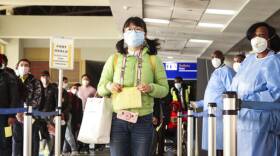EXPLORE MORE
Coming up Wednesday on BPR (on tape):
PBS European travel guru Rick Steves
Nobel Peace Prize-winning journalist Maria Ressa
Indie rock band Carbon Leaf
Husband-and-wife duo Roger Brown and Linda Mason
Recent segments
-
The Story Of Aaron Hernandez Is An 'American Tragedy' Says Sue O'Connell
What would the former Patriots player and convicted murderer have been like without football brain injuries? -
Juliette Kayyem: The Trump Administration Isn't Prepared For The Coronavirus
Yes, we should be focusing on the flu, but we should also be wary of just how unprepared we are for an outbreak in America. -
Leung: Harvard Scientist Scandal Raises Questions About The School's Ability To Protect Itself From Infiltration
On Tuesday, US Attorney for Massachusetts Andrew Lelling charged the chairman of Harvard University’s department of chemistry and chemical biology, Charles Lieber, with lying about his connections to a Chinese university. -
Medical Record Company Is 'Wrong, Wrong, Wrong' To Block Data Sharing, Says Art Caplan
Epic is being critiqued for not making its medical data easier to be shared between doctors and patients. -
Minority Business Owners Still Facing Obstacles In Opening Marijuana Shops In MA
After more than a year since the first marijuana shops in the state opened their doors, however, many minority business owners say they’ve been locked out of the marijuana industry. -
Move Over Organic Food, The Next Restaurant Trend Is Restorative Dining
Fine dining restaurants are serving up climate-minded meals.
Listen to previous shows
-

Art Caplan Reflects on “Abysmal” U.S. Leadership Through COVID-19 Pandemic
Medical ethicist Art Caplan joined Boston Public Radio on Thursday, where he lambasted the Trump administration’s handling of the coronavirus pandemic, which he called “the single most important issue of his presidency." Caplan noted that while the U.S. makes up only four percent of the world’s population, it accounts for a fifth of all global COVID-19 deaths. “That’s inexcusable,” he said, placing responsibility on the president and his administration for "not managing to keep our death rate down.” "We have no federal policy – he left it up to the states, which allowed the virus to find a home in certain parts of the country, and kick back. So it really has been abysmal leadership.” Caplan is the Drs. William F and Virginia Connolly Mitty Chair, and director of the Division of Medical Ethics at the NYU Grossman School of Medicine. -

Juliette Kayyem: Over 200,000 Americans Now Dead From COVID-19
Over 200,000 Americans have now died from COVID-19, homeland security expert Juliette Kayyem told Boston Public Radio on Wednesday. “And we suspect that this is an undercount, because maybe some people are not being counted for dying of COVID, or they had an underlying condition which catches them first,” she said. “There’s excess deaths everywhere we look, so the 200,000 number, I think, at the minimum is shocking, outrageous, inexcusable enough, but it’s probably not the right number.” Kayyem is an analyst for CNN, former assistant secretary at the Department of Homeland Security and faculty chair of the homeland security program at Harvard University’s Kennedy School of Government. -

BPR Full Show: The Learning Curve
Today on Boston Public Radio: We opened lines to talk with listeners about your experiences around school reopening. NBC Sports Boston reporter and anchor Trenni Kusnierek recapped the latest sports headlines, from losses by the Patriots and Celtics, to debate over whether college athletes should have more access to coronavirus testing than their collegiate peers. Filmmaker Michael Kirk discussed his latest documentary for FRONTLINE, “The Choice 2020: Trump vs. Biden.” Food writer Corby Kummer talked about guidelines for safe indoor dining, restaurants that're imposing COVID-19 surcharges, and why sales of tofu are through the roof. Boston Globe business columnist Shirley Leung discussed debate around who Gov. Charlie Baker ought to choose to replace the late SJC Chief Justice Ralph Gants, and spoke on how her kids are handling hybrid learning. CNN’s John King discussed Tuesday's news that the U.S. has passed 200,000 COVID-19 deaths, and increasing certainty that Senate Republicans will elect a Supreme Court justice before the November election. We reopened our lines to continue the conversation with listeners about how you’re handling the quasi-return to schools. -

Corby Kummer: The 'Big Problems' With Indoor Dining
A recent Centers for Disease Control and Prevention (CDC) study found that adults who’ve tested positive for COVID-19 were twice as likely to have eaten at restaurants. But the study is facing criticism for its lack of distinction between diners who ate at indoor versus outdoor establishments, food writer Corby Kummer said. “I do trust the CDC, but the study they released did not differentiate between bars or restaurants or between indoor and outdoor dining,” he said. It’s a challenge for restaurants to successfully and safely have indoor dining, Kummer said, but possible if everyone, specifically diners, follow health guidelines. “There are going to be big problems for restaurants trying to open indoors, but there’s a path forward if they follow the rules and insist that their diners follow the rules,” he said. “As for bars, they’re probably not go to reopen until there’s a vaccine that’s well established, and that’s a good year.” Kummer is a senior editor at The Atlantic, an award-winning food writer, and a senior lecturer at the Tufts Friedman School of Nutrition and Policy. -

BPR Full Show 9/21/20: Ruth, Remembered
Today on Boston Public Radio: Dahlia Lithwick, a legal correspondent and senior editor at Slate, discussed the legacy of the late Justice Ruth Bader Ginsburg as a feminist icon, and reflected on her experience interviewing her in January. Vermont Sen. Patrick Leahy discussed his views on the danger of politicizing the Supreme Court, and why he believes most Senate Republicans will fall in line behind Sen. McConnell’s efforts to fill the vacancy left by Justice Ruth Bader Ginsburg before the November election. We opened lines to hear your impressions on the passing of Justice Ruth Bader Ginsburg, and efforts by Senate leaders and President Trump to replace her before the November election. Martha Minow spoke on late Justice Bader-Ginsburg, and the legal legacy left in her wake. Minow is the 300th Anniversary University Professor at Harvard University, and a former Dean of Harvard Law School. Her latest book is "When Should Law Forgive?" We reopened lines to talk with listeners about the death of Justice Ruth Bader Ginsburg, and what’s to come for the Supreme Court. Boston University law professor Jay Wexler, who clerked for Bader Ginsburg in the late nineties, talked about his experience working under the late Supreme Court justice. Michael Curry and Jennifer Nassour offered their takes on Justice Bader Ginsburg’s passing, and weighed in on the effort by Senate Republicans and President Trump to fill her vacancy before the election. Curry is the Deputy CEO & General Counsel for the Mass. League of Community Health Centers and a member of the National NAACP Board of Directors, where he chairs the board's Advocacy and Policy Committee. Nassour is the former chair of the Mass. Republican Party, and founder of the Pocketbook Project, a non-profit organization dedicated to recruiting, supporting, and electing more female candidates to public office. We closed the show by returning to listeners, to get your thoughts on the passing of Justice Ruth Bader Ginsburg and discuss the road ahead for the Supreme Court.









